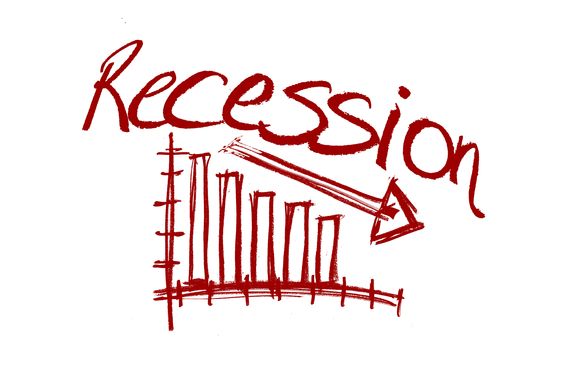what is a recession: A recession is a period of economic decline spread across the economy, lasting more than two quarters. It is typically accompanied by a decline in GDP, employment, and retail sales. Recessions can be caused by a variety of factors, including financial crises, wars, natural disasters, and government policies.
What are the signs of a recession?

There are a number of signs that an economy is entering a recession. These include:
- A decline in GDP: GDP is the total value of goods and services produced in an economy. A decline in GDP indicates that the economy is shrinking.
- An increase in unemployment: Unemployment is the number of people who are actively looking for work but cannot find a job. An increase in unemployment indicates that the economy is not creating enough jobs to meet the demand for labor.
- A decline in retail sales: Retail sales are the total value of goods sold to consumers. A decline in retail sales indicates that consumers are spending less money.
- A decline in business investment: Business investment is the spending by businesses on new equipment and structures. A decline in business investment indicates that businesses are not confident about the future of the economy.
What are the effects of a recession?
Recessions can have a number of negative effects on an economy. These include:
- Increased unemployment: As businesses cut back on production, they lay off workers. This leads to increased unemployment, which can have a ripple effect throughout the economy.
- Reduced income: When people lose their jobs, they have less money to spend. This reduces demand for goods and services, which can lead to further job losses.
- Increased poverty: As unemployment and income decline, poverty rates increase. This can lead to a number of social problems, such as crime and homelessness.
- Reduced government revenue: As the economy shrinks, government tax revenue declines. This can lead to cuts in government spending, which can further harm the economy.
How can a recession be avoided?

There is no surefire way to avoid a recession. However, there are a number of things that governments and businesses can do to reduce the risk of a recession. These include:
- Maintaining sound fiscal and monetary policies: Fiscal policy refers to government spending and taxation. Monetary policy refers to the money supply and interest rates. Both fiscal and monetary policies can be used to stimulate economic growth and prevent recessions.
- Ensuring financial stability: Financial stability is important because it helps to prevent financial crises, which can lead to recessions. Governments can promote financial stability by regulating the financial system and monitoring financial markets.
- Investing in education and training: Education and training can help workers to develop the skills they need for the jobs of the future. This can help to boost economic growth and prevent recessions.
Effects of recession on small businesses in the USA
Small businesses are the backbone of the U.S. economy, accounting for 99.7% of all businesses and 47.1% of private sector employment. However, small businesses are also disproportionately affected by recessions.
Small businesses are more likely to be affected by recessions than large businesses for a number of reasons. First, small businesses have less access to capital than large businesses. This makes it difficult for small businesses to weather a recession, as they may not have the resources to cover expenses or make payroll if sales decline.
Second, small businesses are more likely to be dependent on local demand than large businesses. This means that small businesses are more vulnerable to changes in consumer spending, as they may not have the ability to sell their products or services to other markets.
Third, small businesses are more likely to be located in areas that are hit hard by recessions. This is because small businesses are often located in areas that are dependent on a particular industry, such as manufacturing or tourism. When these industries decline, it can have a ripple effect on the local economy, which can lead to job losses and a decrease in demand for goods and services.
The effects of a recession on small businesses can be devastating. In the 2008 recession, for example, the number of small businesses in the U.S. declined by 1.5 million. This led to the loss of millions of jobs and a decrease in economic activity.

There are a number of things that small businesses can do to prepare for and weather a recession. These include:
- Maintaining a strong cash flow: Small businesses should have enough cash on hand to cover expenses for at least three months. This will help to ensure that the business can continue to operate even if sales decline.
- Reducing expenses: Small businesses should review their expenses and identify areas where they can cut costs. This may include reducing staff, negotiating lower prices with suppliers, or eliminating unnecessary expenses.
- Diversifying their customer base: Small businesses should try to sell their products or services to a variety of customers, rather than relying on a single source of income. This will help to protect the business from a decline in demand from any one customer group.
- Building relationships with their suppliers: Small businesses should build strong relationships with their suppliers. This will help to ensure that they can continue to get the goods and services they need, even if prices increase or supplies become scarce.
- Staying informed: Small businesses should stay informed about the economy and the potential impact of a recession. This will help them to make informed decisions about how to prepare for and weather a recession.
By taking these steps, small businesses can increase their chances of surviving and thriving during a recession.
Job opportunities during a recession in the United States

A recession is a period of economic decline, typically lasting for two or more quarters. During a recession, consumer spending and business investment decline, which leads to job losses and a decrease in economic activity. Here are some job opportunities that may be available during a recession in the United States:-
- Healthcare: Healthcare is a recession-proof industry, as people always need medical care. There are many different jobs in healthcare, including doctors, nurses, pharmacists, and technicians.
- Education: Education is another recession-proof industry, as parents always want their children to have a good education. There are many different jobs in education, including teachers, administrators, and counselors.
- Government: Government jobs are often considered to be recession-proof, as the government is always in need of workers to provide essential services. There are many different jobs in government, including civil servants, law enforcement officers, and firefighters.
- Technology: The technology industry is growing rapidly, and there are many different jobs available in this field. These jobs include software developers, web developers, and IT professionals.
- Customer service: Customer service jobs are always in demand, as businesses need to provide excellent customer service to keep their customers happy. These jobs can be found in a variety of industries, including retail, hospitality, and telecommunications.
It is important to note that even in a recession, there will be some industries that are more affected than others. For example, the manufacturing and construction industries are often hit hard during recessions. If you are looking for a job during a recession, it is important to consider the industries that are most likely to be resilient.
Tips for finding a job during a recession:
- Network: Networking is one of the best ways to find a job. Talk to your friends, family, and former colleagues to see if they know of any job openings.
- Update your resume: Make sure your resume is up-to-date and highlights your skills and experience.
- Be prepared to negotiate: In a recession, you may have to negotiate your salary or benefits. Be prepared to walk away from an offer that is not right for you.
- Don’t give up: The job market may be tough, but don’t give up. Keep looking for a job and eventually you will find one.
How to survive a recession in the USA ?

Surviving a recession in the USA requires careful financial planning, smart decision-making, and adapting to the changing economic conditions. Here are some tips on how to survive a recession in the USA:
- Create an emergency fund: An emergency fund is money that you set aside to cover unexpected expenses, such as a job loss, medical emergency, or car repair. It is recommended to have at least 3 to 6 months of living expenses saved in your emergency fund.
- Pay down debt: Debt can be a major financial burden, especially during a recession. If you have high-interest debt, such as credit card debt, make it a priority to pay it down. This will free up more money in your budget and help you weather the recession.
- Live below your means: One of the best ways to protect yourself financially during a recession is to live below your means. This means spending less money than you earn. There are a number of ways to do this, such as cooking at home more often, cutting back on unnecessary expenses, and finding ways to save money on your monthly bills.
- Invest in yourself: During a recession, it is more important than ever to invest in yourself. This means continuing your education, developing new skills, and networking with other professionals. By investing in yourself, you will be better positioned to find a job and succeed in your career.
- Stay positive: It is important to stay positive during a recession. Remember that recessions are temporary, and the economy will eventually recover. By staying positive and taking steps to protect yourself financially, you will be in a better position to weather the storm.
Some additional tips that may be helpful during a recession:
Surviving a recession in the USA requires careful financial planning, smart decision-making, and adapting to the changing economic conditions. Here are some strategies to help you navigate through a recession:
1. Assess your financial situation: Start by evaluating your current financial position, including your income, expenses, savings, and debts. Identify areas where you can cut back on expenses and create a realistic budget.
2. Build an emergency fund: Establish an emergency fund to cover unexpected expenses or job loss. Aim to save three to six months’ worth of living expenses in a separate savings account.
3. Reduce debt: Minimize your debt burden by paying off high-interest debts as much as possible. Focus on credit cards, personal loans, and other high-interest obligations. Consider refinancing options to lower interest rates.
4. Diversify your income sources: Explore ways to diversify your income by taking on a side job, freelancing, or starting a small business. Having multiple income streams can provide stability during a recession.
5. Enhance job security: During a recession, job security becomes crucial. Update your skills through professional development and training programs to stay competitive in the job market. Network, attend industry events, and build relationships that may lead to new opportunities.
6. Prioritize essential expenses: Identify your essential expenses and prioritize them over non-essential ones. Cut back on discretionary spending and focus on essentials like housing, utilities, food, and healthcare.
7. Save on daily expenses: Look for ways to save money on daily expenses. Shop for groceries wisely, compare prices, use coupons, and consider buying generic brands. Reduce energy consumption, carpool, and utilize public transportation if possible.
8. Protect your investments: Review your investment portfolio and consider diversifying it to reduce risk. Consult with a financial advisor to assess your investment strategy and make adjustments if necessary.
9. Maintain a positive mindset: Dealing with a recession can be challenging both financially and emotionally. Stay positive, surround yourself with supportive people, and seek professional help if needed. Focus on personal growth and maintain a long-term perspective.
10. Stay informed: Stay updated on economic trends, government policies, and industry changes. Understanding the broader economic landscape can help you make informed decisions and adapt your strategies accordingly.
Remember, every individual’s situation is unique, and it’s important to tailor these strategies to your specific circumstances. Adaptability, resilience, and proactive financial management are key to surviving a recession in the USA.
Best investments during an economic downturn in America

It’s important to note that investing during an economic downturn carries risks, and it’s advisable to consult with a financial advisor who can provide personalized guidance based on your specific financial situation and goals. Additionally, thorough research and analysis are crucial before making any investment decisions.
During an economic downturn in America, it is essential to approach investments with caution and consider strategies that may help mitigate risk. Here are some investment options to consider during an economic downturn:
1. Bonds: Government bonds and high-quality corporate bonds are generally considered safer investments during a recession. They offer fixed interest payments and have lower risk compared to stocks.
2. Dividend-Paying Stocks: Companies that have a history of stable dividend payments may provide a source of income during an economic downturn. Look for companies with strong financials and a track record of maintaining or increasing dividends even in challenging times.
3. Defensive Stocks: Certain sectors tend to be less affected by economic downturns. Examples include consumer staples (e.g., food, beverages, household essentials), healthcare, and utilities. These sectors may offer more stability during a recession.
4. Real Estate Investment Trusts (REITs): REITs are companies that own and manage income-generating properties, such as commercial buildings, apartments, or healthcare facilities. They provide the opportunity to invest in real estate without direct property ownership. REITs with a focus on essential services or stable long-term leases may be more resilient during an economic downturn.
5. Gold and Precious Metals: Precious metals, particularly gold, are often considered a safe haven during economic uncertainties. Gold tends to hold its value or even appreciate during times of market volatility. Investors can consider purchasing physical gold or invest in gold exchange-traded funds (ETFs).
6. Defensive ETFs: Exchange-traded funds (ETFs) that track indices composed of defensive sectors or low-volatility stocks can provide diversification and potentially reduce risk during a recession.
7. Cash and Cash Equivalents: Holding cash or cash equivalents, such as money market funds or short-term Treasury bills, can provide stability and liquidity during an economic downturn. It allows you to take advantage of investment opportunities that may arise when markets are down.
8. Peer-to-Peer Lending: Peer-to-peer lending platforms enable individuals to lend money to borrowers and earn interest. Carefully research platforms with a good track record and robust risk assessment processes to minimize the potential for defaults.
9. Education and Skills Development: Consider investing in your own education and skill development during a downturn. Enhancing your qualifications or learning new skills can position you for better job prospects and income growth in the long run.
Recession-proof industries in the United States
There is no such thing as a truly recession-proof industry, but there are some industries that are more resilient than others during economic downturns. Some of the most recession-proof industries in the United States include:
- Healthcare: People still need healthcare, even during a recession. This makes the healthcare industry a good choice for those looking for a stable career.
- Education: Education is another industry that is relatively recession-proof. People still want to get an education, even when the economy is tough.
- Government: Government jobs are also relatively recession-proof. The government still needs to provide essential services, even during an economic downturn.
- Utilities: Utilities, such as water, electricity, and gas, are also relatively recession-proof. People still need these services, even when they are struggling financially.
- Consumer staples: Consumer staples, such as food, toiletries, and cleaning supplies, are also relatively recession-proof. People still need these products, even when they are cutting back on their spending.
It is important to note that even these recession-proof industries can be affected by economic downturns. For example, the healthcare industry may see a decrease in demand for elective procedures, and the education industry may see a decrease in enrollment. However, these industries are generally more resilient than others and are less likely to experience significant layoffs or furloughs during a recession.
If you are looking for a career that is relatively recession-proof, consider working in one of these industries. You may also want to consider developing skills that are in high demand in these industries, such as nursing, teaching, or engineering.
Unemployment benefits during a recession in the USA

Unemployment benefits are payments made to people who are unemployed and meet certain eligibility requirements. These benefits can help to provide financial support during a recession, when it may be difficult to find a new job.
In the United States, unemployment benefits are administered by the states. The amount of benefits and the eligibility requirements vary from state to state. However, in general, to be eligible for unemployment benefits, you must:
- Be able to work
- Be actively looking for work
- Have earned a certain amount of money in the past year
The amount of unemployment benefits you receive will depend on your earnings and the number of dependents you have. In general, you will receive a weekly benefit that is a percentage of your previous earnings. The maximum weekly benefit amount is set by each state.
Unemployment benefits typically last for 26 weeks. However, if you are unable to find a job after 26 weeks, you may be eligible for extended benefits. Extended benefits are funded by the federal government and can last for an additional 13 weeks.
If you are unemployed during a recession, you should apply for unemployment benefits as soon as possible. You can apply for benefits online, by mail, or in person at your local unemployment office.
Some additional tips for applying for unemployment benefits:
Unemployment benefits can provide much-needed financial support during a recession. If you are unemployed, you should apply for benefits as soon as possible.
- Keep track of your earnings: You will need to provide proof of your earnings when you apply for benefits. Keep track of your pay stubs and W-2 forms.
- File your claim on time: You must file your claim for benefits within a certain time period after you become unemployed. Check with your state’s unemployment office to find out the deadline.
- Be prepared to provide information: When you file your claim, you will need to provide information about your employment, your earnings, and your dependents. Be prepared to provide this information when you file your claim.
Recession impact on the stock market in America

A recession is typically defined as two consecutive quarters of negative economic growth. During a recession, consumer spending and business investment decline, which leads to job losses and a decrease in economic activity. This can have a significant impact on the stock market.
Stock prices tend to fall during recessions. This is because investors become less confident in the future of the economy and the companies that are listed on stock exchanges. As a result, they are less willing to pay high prices for stocks.
The extent to which stock prices fall during a recession depends on a number of factors, including the severity of the recession and the overall health of the economy. In some cases, stock prices may fall by more than 50%.
The impact of a recession on the stock market can be long-lasting. It can take several years for stock prices to recover to their pre-recession levels.
Here are some tips for investors during a recession:
- Stay calm: It is important to stay calm and not panic sell during a recession. Remember that the market will eventually recover, and you don’t want to sell your investments at a loss.
- Rebalance your portfolio: If your portfolio is heavily weighted towards stocks, you may want to consider rebalancing it to include more bonds or other safe assets. This will help to reduce your risk and protect your investments during a recession.
- Invest for the long term: It is important to remember that investing is a long-term game. Don’t expect to get rich quick. Instead, focus on investing for the long term and let your investments grow over time.
How the stock market has performed during past recessions
The stock market has typically performed poorly during recessions. This is because investors become less confident in the future of the economy and the companies that are listed on stock exchanges. As a result, they are less willing to pay high prices for stocks.
The extent to which stock prices fall during a recession depends on a number of factors, including the severity of the recession and the overall health of the economy. In some cases, stock prices may fall by more than 50%.
The impact of a recession on the stock market can be long-lasting. It can take several years for stock prices to recover to their pre-recession levels.
Performance of the stock market during past recessions:
- The Great Recession (2008-2009): The S&P 500 index fell by 57% from its peak in October 2007 to its trough in March 2009.
- The Early 1990s Recession (1990-1991): The S&P 500 index fell by 33% from its peak in August 1987 to its trough in July 1991.
- The Early 1980s Recession (1980-1982): The S&P 500 index fell by 27% from its peak in August 1980 to its trough in July 1982.
It is important to note that past performance is not a guarantee of future results. The stock market can be volatile, and there is no guarantee that it will recover from a recession as quickly as it has in the past.
Effects OF recessionon consumer spending habits in the United States

A recession is a period of economic decline that typically lasts for two or more consecutive quarters. During a recession, consumer spending habits tend to change. Consumers may become more cautious about spending money, and they may be more likely to save money or pay down debt. This can lead to a decline in sales for businesses, which can further contribute to the economic downturn.
There are some of the ways that a recession can affect consumer spending habits in the United States:
- Consumers may cut back on discretionary spending- This includes things like eating out, going to the movies, and shopping for new clothes.
- Consumers may be more likely to shop at discount stores- This is because discount stores offer lower prices on a variety of goods and services.
- Consumers may be more likely to use coupons and promo codes- This is because coupons and promo codes can help consumers save money on their purchases.
- Consumers may be more likely to comparison shop- This is because comparison shopping can help consumers find the best deals on the goods and services they need.
- Consumers may be more likely to buy used goods- This is because used goods are often much cheaper than new goods.
It is important to note that not all consumers will change their spending habits during a recession. Some consumers may continue to spend money as they normally do, while others may actually increase their spending. However, overall, consumer spending tends to decline during a recession.
Here are some tips for businesses on how to weather a recession:
- Focus on your core customers- During a recession, it is important to focus on your core customers. These are the customers who are most likely to continue to buy from you, even during tough economic times.
- Offer discounts and promotions- Offering discounts and promotions can help you attract new customers and keep your existing customers coming back.
- Improve your customer service- Excellent customer service can help you differentiate yourself from your competitors and build loyalty with your customers.
- Be flexible- Be prepared to adapt your business model as the economy changes. This may mean changing your product offerings, your pricing, or your marketing strategies.
By following these tips, businesses can increase their chances of surviving a recession.
Conclusion
Recessions are a normal part of the economic cycle. However, they can have a number of negative effects on an economy. Governments and businesses can take steps to reduce the risk of a recession, but there is no surefire way to avoid them.